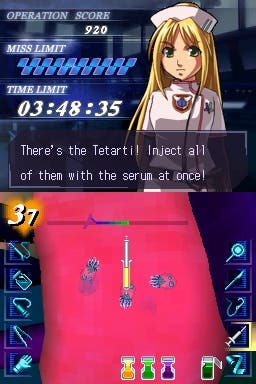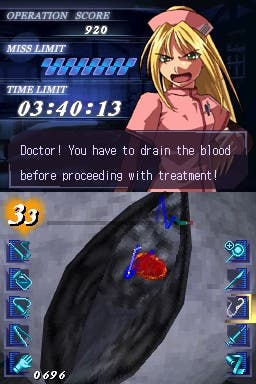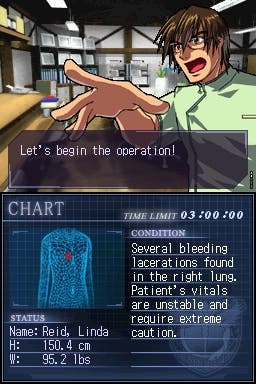Trauma Center: Under the Knife
Phoenix Wright for the patient?
It's not easy being a doctor! A profession constantly on the move, it demands confidence, deftness of touch, sharp reflexes, superhuman concentration, relationship skills, bomb-defusal knowledge... Well, here it does.
This obviously isn't a surgery simulation, so the devs have had to edit the practical tools down to a set of ten, and the demands down to a set of stylus-driven challenges. Managing to convey the above requirements under such constraints is quite a feat, and Trauma Center deserves credit for it.
Adopting the mantle of Dr Stiles, a young doctor at Hope Hospital, you're quickly thrown into the OR. "Let's begin the operation!" he blurts with Phoenix Wrightian mania. During the initial section of the game, you're hand-held through touch-screen surgeries by departing nurse Mary on the top-screen, who teaches you the basics of making incisions, delivering injections, applying gel, suturing (stitching), handling forceps, applying artificial membranes and doing all of that while maintaining a patient's vital signs. This sets the tone for what follows.
With Mary gone, you botch your first big op - ignoring advice from her saucy replacement with the big doe eyes - and so you set out to make up for it. Which you do with aplomb. After demonstrating incredible concentration in a life-saving surgery, your superiors inform you that you have a special gift, the Healing Touch. Think of it as Bullet Time for doctors - by drawing a five-pointed star you can act in slow motion for as long as your special-points bank holds up. Applying this talent to conquer an unknown virus that swims around a young girl's vital organs like a slash-happy fish, you become a target for Caduceus - an organisation that fights bio-terrorism. You join the fight against this new virus, GUILT, and its many strains.

You face various surgeries throughout the game's episodes - all with preset parameters, areas to focus, and outcomes that feed the ongoing story, so you can't, for example, accidentally sever someone's legs during a winning surgery and then have to explain yourself afterwards. Pity! Each patient presents a new combination of tumours, internal lacerations and GUILT strains, spawning various cuts, small and deep, and other ailments. You have to disinfect, stitch, cut and remove, patch up and use things like a magnifying tool to concentrate on certain areas, or an ultrasound to locate moving targets. Through in-game tutorials you quickly gain a grasp of how to tackle each situation using the various tools available through icons on either side of the screen, and thankfully your assistant is always on hand to shout at you if you're doing the wrong thing, which rarely has that much negative effect anyway. Speed's much more of an issue.
As you proceed, a story's told through manga-style cells on the top-screen with dialogue bubbles as each of the various doctors and key staff pitch in and provide commentary and intrigue. The plot's occasionally amusing, manages to toss in bits of jargon without confusing the novice (so, all of us), and even touches on issues like euthanasia, bio terrorism, and the pressure doctors are forced to work under (complete with the inevitable senior surgeon who'll "never operate again"). Even so, it's hard to take it all too seriously - the quirky characters and sanitised presentation are comparable to Phoenix Wright's, though not quite so engaging or memorable.

Having successfully distilled modern medicine into a formula that's one part Holby City and three parts flamboyant anime, however, Trauma Center goes and lets itself down in other areas. For example, each time you retry an operation, you have to click through all the dialogue again, and you have to repeat the initial easier phase of the operation to return to the bit that killed the patient. There are also occasions where it's necessary to zoom in and out of different areas repeatedly, and the game's reluctance to acknowledge your stylus gestures are a relatively benign contaminant next to the cancerous frustration of discovering your input's not being accepted around the outer edge of the screen while zoomed.
Worse, while the general difficulty of some surgeries can be forgiven for being quite exacting, some are often hideously out of synch with the general curve - and potential showstoppers. In a couple of cases I had to create strategies that involved manipulating the mechanics by continually pausing, or tackling multiple tumours by getting them to a transitional stage I knew to be harmless and moving onto the next without actually dealing with everything at the appropriate time. Even with the Healing Touch, some surgeries are going to take hours of trial and error to complete.

You should avoid the temptation to apply medical-style thinking to that. This is a game where we expose creatures with a stylus and then chase them with a laser beam, defuse bombs with medical knowledge, and speed up our reactions by thumbing pentagrams. It is fair for it to demand quicker and quicker reactions and strategic thinking, but too often you feel like you're being arbitrarily funnelled toward failure. Just as annoying, you can't apply what you've learned on second attempts, and the game's mechanics feel like they're failing you rather than the other way round.
For the patient (ha!), the single-player mode consists of several chapters, each comprising numerous surgeries. The level of variation is fair, including the occasional departure for a logic puzzle, or a mid-air operation where you have to worry about turbulence. Beyond that there's a Challenge mode. The idea here is to tackle previous surgeries again and achieve higher rankings, but as with the rest of the game it can be hard to understand why your efforts are being rated so poorly.
Easily the most frustrating thing about Trauma Center is that it isn't just a failed experiment. It's a good idea, well measured and put together. Its problems are spiking difficulty and mechanical obstinacy. In a genre of one or two, that might be forgivable, but the truth is that DS owners can be better served - by Phoenix Wright in the story-driven stakes, and by whatever falls of the shelf when you kick it in the reactions race. You'll definitely need confidence, deftness of touch, sharp reflexes and superhuman concentration if you're planning to scrub up here, and it never! Gets! Any! Easier!

